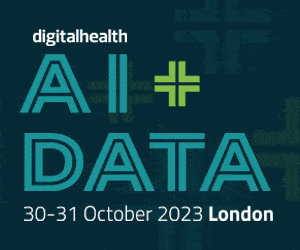Ahead of speaking in a session at the inaugural Digital Health AI and Data conference, Dione Rogers, Simon Noel and Julia Gudgeon appeared on Digital Health Unplugged to speak to Digital Health’s news reporter and podcast host Jordan Sollof about the impact of AI on nursing and midwifery.
Rogers, deputy chief nurse and chief nursing informatics officer at Barking, Havering and Redbridge University Hospitals NHS Foundation Trust, said she “started to get interested in the use of AI a couple of years ago when I was extremely frustrated about nursing documentation in particular.”
She explained how she did a “massive paper picnic” after her trust had reached a point in nursing and midwifery where the burden of documentation was harming clinical practice.
“One of things for me was risk assessments; as nurses and midwives we do copious amounts of risk assessments and I’m not sure how effective they are,” Rogers said.
“I started to look at things like falls risk assessments and actually if you have an EPR, all of the information aside from does the patient have slippers on, is already collected in the record as part of your normal recording of information.
“I started to think about how AI could provide a live risk assessment, a falls risk assessment for a patient, and started to discuss this and explore this. We’re not there yet but it’s coming, and I feel sure that nurses and midwives can be supported through AI and reduce the documentation burden – that’s the holy grail,” she added.
Examples of AI in practice
Gudgeon, national digital midwife lead, maternity at NHS England, was quick to highlight the great work from Portsmouth Hospitals University NHS Trust and its digital midwife Charlotte Taphouse, which she revealed will be looked at in more depth during her presentation at AI and Data.
“They [Portsmouth Hospitals] had a project called Intelligent Automation Transformation. It’s a unit that deliver around about 5,500 babies a year, so an average size unit, and they implemented an electronic patient record system in February 2021.
“But what that actually did was it created an administration burden and it was a significant clinical risk, but you’ll have to attend the event to find out how they did it,” Gudgeon said.
By using AI, Gudgeon confirmed that the trust was able to reduce their administration hours by 17,610 in the first year and their referral time went from two months to 24 hours.
The feedback from the women went from zero to hero and the staff feedback was “absolutely phenomenal”, Gudgeon added, because “they had a backlog of 2,200 referrals and they turned that round and now their capacity is increased by 33%”.
She concluded: “This is proven. This is one hospital, Portsmouth Hospital, that has taken on this challenge and transformed the way that they deliver services for women who are vulnerable and frightened – absolutely phenomenal.”

Digital Health AI and Data on the horizon
The inaugural Digital Health AI and Data conference will take place 30-31 October at the Business Design Centre in London. Registration is available here.
Noel, CNIO at Oxford University Hospitals NHS Foundation Trust and recently elected chair of the Digital Health CNIO Network Advisory Panel, will be speaking in a session alongside Rogers and Gudgeon.
Noel confirmed that he will share “what I got out of my Masters, but it’s all to do with looking at the data environment and the way that EHRs are deployed to support critical thinking, and of course AI and decision support will be involved in there”.
He spoke earlier in the podcast about the future and the need to educate the workforce in order to be able to deal with AI effectively, understand where it’s being used, and also the “risks it presents based on the environment we’re in”.
“If we don’t equip the workforce, then we are setting people up to fail. I think it links in with What Good Looks Like and the principles laid out there in making sure that we have an appropriately skilled workforce AND we have smart foundations,” he said.
The session featuring Rogers, Noel and Gudgeon, titled ‘Transforming Nursing and Midwifery: AI’s Impact on Care and Practice’, will take place on Day One of the event (30 October) at 3.30pm on the AI and Analytics Stage.
The full episode of Digital Health Unplugged: AI in nursing and midwifery, featuring the three AI and Data speakers, will be released on Monday 16 October on Spotify, Apple Podcasts and many of your other favourite podcast platforms.
You can also download the podcast from digitalhealth.podbean.com or through the Podbean app.

